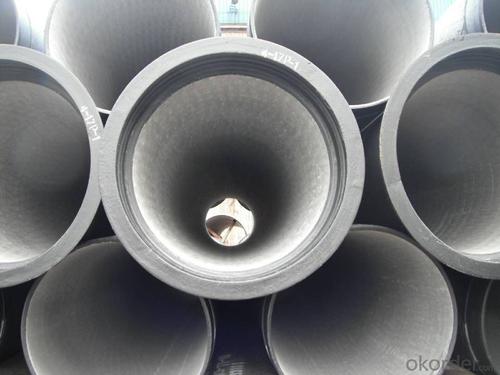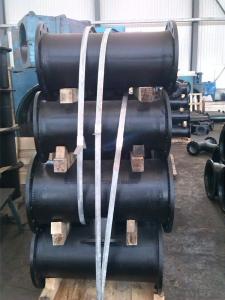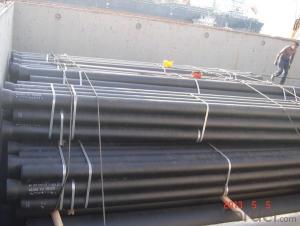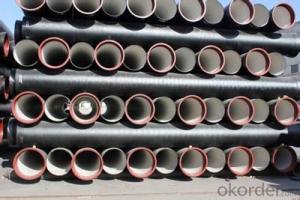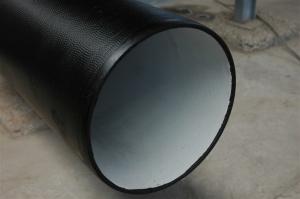DUCTILE IRON PIPE DN80
- Loading Port:
- China Main Port
- Payment Terms:
- TT OR LC
- Min Order Qty:
- -
- Supply Capability:
- -
OKorder Service Pledge
OKorder Financial Service
You Might Also Like
Specification:
1) The standard of pipe: ISO2531:1998, K9
2) Effective length: 6m
3) Inner cement line: Portland cement line as per ISO4179
4) Zinc coating: at least 130g/m2 as per ISO8179
5) Bitumen painting: at least 70um as per ISO8179
6) With 100% quantity of NBR ring, or SBR ring, or EPDM ring as per ISO4633
7) DN80mm-800mm
8) High strength, lighter than grey iron, good corrosion resistance, no furring, small flow resistance, easy fixing, long life tome about 100 yeas
9) Produced by Hangzhou chunfeng machine
10) Checked by automatic inspection equipment
11) Composition:
Chemical composition | |||
Chemical composition | Ductile Cast Iron Pipe (%) | Grey iron pipe (%) | Steel pipe (%) |
C | 3.5-4.0 | 3.2-3.8 | 0.1-0.2 |
Si | 1.9-2.6 | 1.4-2.2 | 0.15-0.4 |
Mn | 0.15-0.45 | 0.4-0.6 | 0.3-0.6 |
P | ≤0.06 | ≤0.3 | 0.02-0.03 |
S | ≤0.02 | ≤0.1 | 0.02-0.03 |
Mg | 0.03-0.06 |
|
|
12) Feature:
Mechanical properties | |||
| Ductile Cast Iron Pipe | Grey Iron Pipe | Steel Pipe |
Tensile Strength(Mpa) | ≥420 | 150-260 | ≥400 |
Yield Strength(Mpa) | ≥300 | No Confirmation | No Confirmation |
Bending Strength(Mpa) | ≥590 | 200-360 | ≥400 |
Elongation (%) | ≥10 | Neglected | ≥18 |
Brinell Hardness(HBS) | ≤230 | ≤230 | About 140 |
13) T type mechanical joint
14) Packing: in bulk or container
- Q: Are ductile iron pipes suitable for installation in areas with high groundwater salinity?
- Areas with high groundwater salinity are generally suitable for the installation of ductile iron pipes. Ductile iron is renowned for its resistance to corrosion, making it a favored choice for various applications, such as water and wastewater systems. High groundwater salinity refers to the increased presence of dissolved salts in the water. Although this can potentially cause corrosion in certain materials, ductile iron pipes are specifically engineered to withstand such conditions. These pipes are equipped with a protective lining, usually composed of cement mortar or polyurethane, which acts as a barrier between the pipe and its surroundings, including highly saline water. The lining serves to prevent any corrosive effects of the high groundwater salinity on the iron pipe, ensuring its long-lasting durability and reliability. Furthermore, ductile iron pipes possess a high tensile strength, enabling them to endure external loads and pressure, even in demanding environments. It is important to acknowledge that the suitability of ductile iron pipes for areas with high groundwater salinity can also be influenced by factors such as the specific levels of salinity, the presence of other corrosive agents, and the overall design and installation practices. Therefore, it is advisable to consult experts or engineers who are familiar with the local conditions in order to determine the most appropriate materials and precautions for specific installation projects.
- Q: Are ductile iron pipes suitable for underground storage tanks?
- Underground storage tanks can indeed benefit from the use of ductile iron pipes. Ductile iron, known for its strength and durability, exhibits exceptional resistance to corrosion and can withstand the immense pressure and weight associated with burial underground. These pipes find widespread application in various underground systems, such as water and sewage systems, owing to their remarkable tensile strength and ability to handle both internal and external loads. Furthermore, ductile iron pipes boast an extended service life, often surpassing 100 years, rendering them a dependable choice for underground storage tanks. They also possess resistance against ground movement and can adapt to soil settling or shifting, thereby ensuring the integrity and stability of the storage tank system. Moreover, the smooth internal surface of ductile iron pipes provides excellent flow characteristics, preventing the accumulation of debris or sediment that may impede the system. Hence, they prove to be an ideal option for storing a diverse range of liquids or substances. In conclusion, the strength, durability, corrosion resistance, and long service life of ductile iron pipes establish them as a suitable and reliable choice for underground storage tanks.
- Q: Ductile iron pipe joint damage, water leakage, want to see the connection with other pipe fittings, how to operate?!
- Sawing grinding head, increasing steel socket set
- Q: Can ductile iron pipes be used for trench crossings?
- Indeed, trench crossings can utilize ductile iron pipes. Renowned for their remarkable strength and durability, ductile iron pipes prove to be fitting for a diverse array of purposes, including trench crossings. Their capacity to endure substantial burdens and external pressures renders them an optimal selection for subterranean installations. Moreover, ductile iron pipes boast exceptional resistance to corrosion, guaranteeing their enduring and dependable performance in the context of trench crossings.
- Q: Can ductile iron pipe be used for both water and wastewater applications?
- Yes, ductile iron pipe can be used for both water and wastewater applications. Ductile iron is a type of iron that has been treated with small amounts of magnesium to create a more flexible and durable material. This makes it suitable for transporting both water and wastewater. Ductile iron pipes are known for their high strength and resistance to corrosion, making them ideal for underground applications. They can handle the high pressures and varying flow rates associated with water distribution systems, as well as the corrosive nature of wastewater. Additionally, ductile iron pipes have a longer lifespan compared to other materials commonly used in water and wastewater applications, such as PVC or concrete. Therefore, they are often chosen for projects that require a reliable and long-lasting pipe material for both water and wastewater transport.
- Q: Can ductile iron pipes be recycled?
- Yes, ductile iron pipes can be recycled. Ductile iron is a highly recyclable material, and the pipes can be melted down and reused in various applications, reducing the need for raw materials and promoting a more sustainable approach to infrastructure development.
- Q: Are ductile iron pipes suitable for irrigation canal systems?
- Yes, ductile iron pipes are suitable for irrigation canal systems. Ductile iron pipes have high strength and durability, making them resistant to external loads and pressure variations common in irrigation systems. They also have excellent corrosion resistance, ensuring a long lifespan and minimizing maintenance needs. Additionally, ductile iron pipes have smooth interiors, reducing friction and allowing for efficient water flow, which is crucial for irrigation canal systems.
- Q: Ductile iron gears are generally treated without heat treatment
- The mechanical properties of ductile iron are equivalent to quenched and tempered steel. The gears made of ductile iron can be quenched or tempered by high temperature + surface quenching, that is, quenching and tempering treatment + surface hardening.
- Q: How does ductile iron pipe compare to PVC pipe in terms of performance and cost?
- Ductile iron pipe and PVC pipe are two commonly used materials for various piping applications, and they have distinct differences in terms of performance and cost. In terms of performance, ductile iron pipe is known for its exceptional strength and durability. It is highly resistant to internal and external pressures, making it suitable for carrying water, sewage, and other fluids under high pressure conditions. Ductile iron pipe also has an excellent resistance to corrosion and can withstand extreme temperature variations. Moreover, it has a longer lifespan, often lasting over 100 years, which makes it a reliable choice for long-term projects. On the other hand, PVC pipe is renowned for its versatility and ease of installation. It is lightweight, making it easier to transport and handle during installation. PVC pipe is also resistant to chemicals, making it suitable for applications where corrosion may be a concern. However, PVC pipe may not be as durable as ductile iron pipe, especially when subjected to external pressure or harsh environmental conditions. It may also be susceptible to cracking or breaking under extreme temperatures. In terms of cost, PVC pipe is generally less expensive than ductile iron pipe. PVC pipe is manufactured using less costly materials and is easier to produce, resulting in lower production costs. Additionally, the lightweight nature of PVC pipe reduces transportation costs and makes installation more efficient. Ductile iron pipe, on the other hand, tends to be more expensive due to the higher costs associated with its manufacturing process and the heavier weight, which requires additional handling and transportation expenses. Ultimately, the choice between ductile iron pipe and PVC pipe depends on the specific requirements of the project. If strength, durability, and longevity are crucial, ductile iron pipe may be the preferred option despite its higher cost. However, for applications that require versatility, ease of installation, and cost-effectiveness, PVC pipe can be a suitable alternative.
- Q: Can cast iron pipes not be used for domestic water supply and drainage?
- Cast iron pipes are mostly used in fire fighting, fire hydrant water supply and indoor water supply. Plastic pipes are used in general and high water riser pipes are made of plastic steel composite pipes
Send your message to us
DUCTILE IRON PIPE DN80
- Loading Port:
- China Main Port
- Payment Terms:
- TT OR LC
- Min Order Qty:
- -
- Supply Capability:
- -
OKorder Service Pledge
OKorder Financial Service
Similar products
Hot products
Hot Searches
Related keywords




